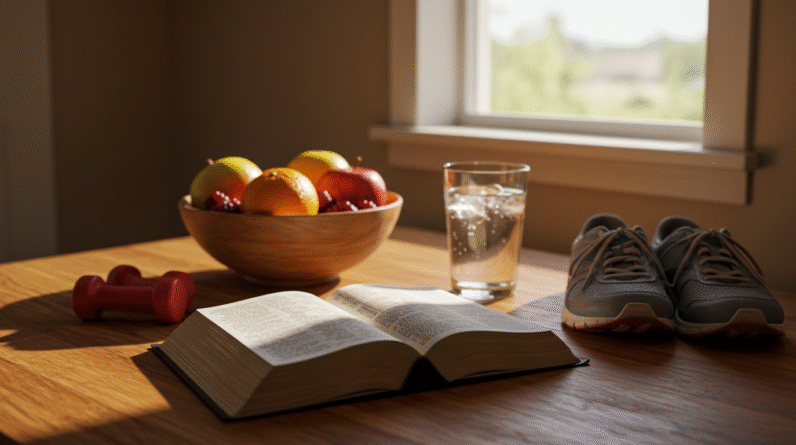10 Healthy Living Tips Inspired By The Bible
You notice how people talk about health as if it’s only about gym membership or meal plans. But health is also something that moves through your relationships, your mornings, your nights, the way you carry grief and gratitude. This piece gathers ten healthy living tips from Scripture—practical, humane, not pious posturing—so you can read, try, and let them sit in the way a slow rain sits on a roof. Each tip is paired with a verse you can check on Bible Gateway if you want to read it in context. These are not rules to beat yourself up with; they’re invitations to notice what’s already shaping you.
The phrase you should keep in mind as you move through this is “healthy living tips from the Bible.” That sounds like a category, like something to file, but let it also sound like an offer: small practices that gather to become steadiness. You’ll find those words again in the middle of the article, and later, because repetition helps hold things.
Tip 1 — Keep Sabbath: rest is rhythm, not reward
There’s a quiet discipline in not filling every minute. The Bible’s instruction to remember the Sabbath isn’t about compulsion so much as rhythm: a space in your week that refuses to be consumed. If you feel your hands twitch toward your phone every free moment, Sabbath is the radical refusal to let work and obligation colonize your attention. Treat the Sabbath not as one more item to perfect but as a kind of homecoming—regular, imperfect, and necessary. If you begin to take it seriously, you’ll notice your anxieties don’t have as much purchase; they can’t sit in all the corners at once. The command is plain in Scripture and also oddly tender: there is a time for labor, and there is a time for rest. See Exodus 20:8-11 for the passage that frames rest as part of righteousness.
Tip 2 — Choose food that steadies you
You don’t have to become militant about every calorie, but you do have to notice what you reach for when you’re tired or tender. Scripture has examples that value simple, nourishing choices. When Daniel and his friends chose vegetables and water rather than the king’s richer fare, it wasn’t an ascetic stunt: it was a decision that preserved clarity and vitality, and it showed that you can take care of your body in ways that are sustained and clear-minded. Food is not only fuel; it’s also a daily curriculum in patience and self-respect. Make your plate reflect that you intend to keep living well for years, not just to hit a target before a holiday. See Daniel 1:12-15.
Tip 3 — Tend your mind: resist the tyranny of worry
Worry feels industrious. It proposes that if you spend enough time imagining outcomes, you might control them. If you listen to the Bible’s counsel on anxiety, it’s quietly subversive: hand over what you can’t carry alone. You can do the practical thing—plan, organize, make lists—and also practice releasing the rest. The New Testament directs you toward prayer and thanksgiving as antidotes to anxiety, not as magical incantations but as ways of reorienting your focus from spiraling to steadying. Practicing gratitude doesn’t deny difficulty; it simply reminds you that you are not only what you fear. Try saying a short prayer or a sentence of thanks each morning; make it specific. Over time, you’ll notice the mental clutter loosening. See Philippians 4:6-7 for guidance that’s practical and humane. This is one of the most useful healthy living tips from the Bible for everyday nerves.
Tip 4 — Grow self-control like a small garden
Health isn’t about perfect performance; it’s about systems you’ve gently put in place. The fruit of the Spirit includes self-control, and it’s described not as a harsh virtue but as a fruit—something that grows when conditions are right. You can cultivate self-control by making simpler choices in several small domains: how late you stay up, how you manage sugar, and how you respond to provocation. Think of each choice as a seed. If you plant something repeatedly, it becomes easier to produce. Self-restraint does not mean you always deny yourself pleasure; it means you align your pleasures with things that keep you going. If you treat willpower like a muscle, not a moral yardstick, you’ll stop resenting yourself for failing sometimes. See Galatians 5:22-23.
Tip 5 — Keep the people you need close
You’re not designed to be solitary in the work of being whole. The Bible says to encourage one another and not neglect meeting together, which is both practical and existential: relationships shape your habits, provide accountability, and buffer loneliness in ways that diet alone cannot. Health is social. If you only ever try to fix yourself in isolation, you’ll miss how your body and mind respond to shared life—warmth, friction, humor, the small rhythms of care. Seek friendships that allow you to be ordinary and honest; find people who will tell you what you won’t easily hear and who will sit with you when there are no tidy solutions. That kind of presence is medicine. See Hebrews 10:24-25.]

Tip 6 — Honor your body: it’s a home, not just an instrument
There’s a strange reverence in the Bible’s assertion that your body is a temple. It’s not merely pragmatic advice to eat well and exercise; it’s an ethical claim about stewardship. The decisions you make about sleep, movement, and medical care are not incidental—they’re a kind of moral attention. When you treat your body with basic dignity—sleeping when you need to, consulting a doctor when things are off—you’re practicing a quiet theology of care. This doesn’t have to be heroic. Most days, it will look like a sensible routine: consistent sleep, reasonable meals, gentle movement. You’re not expected to do dramatic feats; you’re asked to treat what you have with intentional tenderness. See 1 Corinthians 6:19-20. This is a central point among the healthy living tips from the Bible: respect for the body underpins everything else.
Tip 7 — Practice gratitude: it changes the field of perception
There’s a small but transformative thing about gratitude: it changes what you notice. If you begin the day with three small things you’re thankful for, you’ll slow the mind’s habit of compiling lacks. This is not a denial of hardship; gratitude exists alongside grief. Scripture’s often-repeated refrains to give thanks in everything are not naïve. They’re practical: gratitude trains your attention away from scarcity and toward what’s present and reliable. Over time, this practice shifts your baseline mood. Try: each night, name one small consolation or one ordinary mercy that happened to you that day. If you keep doing that, you begin to see life as a mix of difficulty and gifts, which is closer to the lived truth. See 1 Thessalonians 5:16-18. Remember this among the healthy living tips from the Bible as a daily recalibration.
Tip 8 — Work with purpose, but let work not be your whole identity
You probably deserve to work at something you can be proud of, but you also deserve a life that’s not only work. Scripture has a practical way of treating labor: do it heartily, but don’t let it swallow you. When your worth depends on productivity alone, your mental and physical reserves run down. Find ways to tie your daily tasks to something larger than stress—whether it’s care for others, aesthetics, or simply the quiet satisfaction of a job done well. Make boundaries: the end of a workday is a real boundary, and you can practice closing it, even clumsily. This is not an easy lesson in cultures that celebrate overwork, but it keeps you whole. See Colossians 3:23 for a text that helps you reframe labor in less crushing terms. I mention this deliberately: healthy living tips from the Bible include the reminder that your labor is important and not the only measure of you.
Tip 9 — Give and receive compassion: generosity heals
There’s a physicalness to generosity. It changes your posture toward the world and rewires your sympathies. Scripture’s stories about feeding the hungry and welcoming the stranger are practical: generosity trains you to notice other people as people, not problems or projections. When you practice giving—your time, attention, or resources—you enlarge your sense of what matters. Equally important is receiving: humility allows others to participate in your life by helping. Accepting aid is not a weakness; it’s the social reciprocity that keeps communal systems healthy. Try small acts of generosity and see how they reverberate: you’ll notice your own heart loosening at the edges. See Matthew 25:35-40.
Tip 10 — Keep seeking wisdom: consult scripture and practice discernment
Scripture often encourages practical wisdom—an attentiveness to how things actually go when you live in the world. That means you should read and reflect, yes, but also test what you learn against the lived evidence of your days. Wisdom asks questions: What makes you steadier? What undermines you? You can read a verse and take it as a suggestion rather than a law; you can let it rub against your experience. Proverbs has the voice of someone who’s seen outcomes: small repeated choices yield a life. So you’d do well to seek counsel, read slowly, and be willing to change small habits when they don’t serve you. This is not about perfection; it’s about course correction. See Proverbs 3:7-8. Among the healthy living tips from the Bible, pursuing wisdom is the habit that keeps the others from becoming rigid and punitive.

Closing thoughts — small practices, generous patience
You can take these healthy living tips from the Bible in any order, or not at all. They’re not a test; they’re a set of experiments you can run on the scale of weeks and months. Some of them will fit easily; others will resist. You’re allowed to be an awkward beginner. The point is not to add ten more obligations to your life but to notice how a handful of steady practices—rest, decent food, generosity, gratitude, companionship, wise labor, modest self-control, attention to your body, prayerful letting-go, and ongoing learning—aggregate into a life that’s resilient in small, human ways. If you try one and it helps, you’ll know it. If one doesn’t, you can set it down.
Explore More
For further reading and encouragement, check out these posts:
👉 7 Bible Verses About Faith in Hard Times
👉 Job’s Faith: What We Can Learn From His Trials
👉 How To Trust God When Everything Falls Apart
👉 Why God Allows Suffering – A Biblical Perspective
👉 Faith Over Fear: How To Stand Strong In Uncertain Seasons
👉 How To Encourage Someone Struggling With Their Faith
👉 5 Prayers for Strength When You’re Feeling Weak

📘 Jesus and the Woman Caught in Adultery – Grace and Mercy Over Judgement
A powerful retelling of John 8:1-11. This book brings to life the depth of forgiveness, mercy, and God’s unwavering love.
👉 Check it now on Amazon
As a ClickBank Affiliate, I earn from qualifying purchases.
Acknowledgment: All Bible verses referenced in this article were accessed via Bible Gateway (or Bible Hub).
“Want to explore more? Check out our latest post on Why Jesus? and discover the life-changing truth of the Gospel!”








